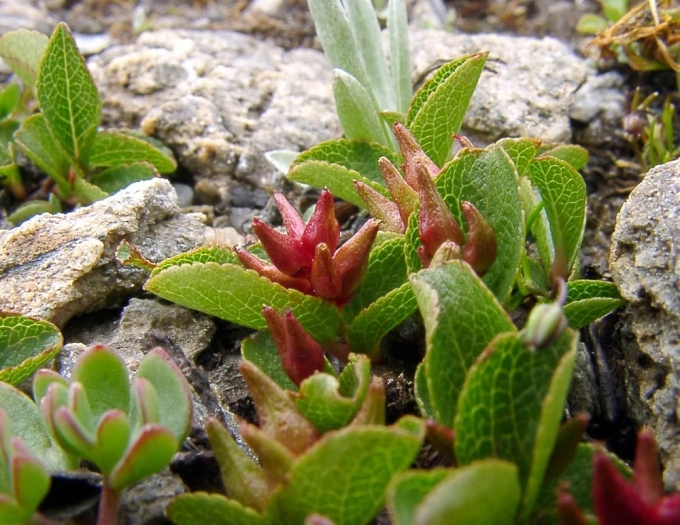Dwarf Willow
(Salix herbacea)
Dwarf Willow (Salix herbacea)
/
/

Thierry Arbault
CC BY 4.0
Image By:
Thierry Arbault
Recorded By:
Copyright:
CC BY 4.0
Copyright Notice:
Photo by: Thierry Arbault | License Type: CC BY 4.0 | License URL: http://creativecommons.org/licenses/by/4.0/ | Rights Holder: Thierry Arbault | Publisher: iNaturalist | Date Created: 2003-07-26T00:00-07:00 |

























Estimated Native Range
Summary
Salix herbacea, commonly known as dwarf willow, is a deciduous, perennial herb native to alpine and arctic tundra environments across the North Atlantic, including northern Europe, Greenland, Iceland, and North America. It is specifically adapted to cold, harsh climates and can be found in a range of habitats from rocky moorlands to moist, but well-drained soils near snowbeds and streams, usually above 4921 feet in the southern parts of its range, but occurring down to sea level in the Arctic. Dwarf willow is one of the smallest woody plants, typically reaching only 0-2 inches in height, with prostrate branches that form dense, ground-hugging mats.
The leaves of Salix herbacea are rounded, shiny green, and have a leathery texture, which helps to minimize water loss. This plant is dioecious, meaning male and female flowers (catkins) are found on separate plants. The flowers are not particularly showy but are of ecological importance for pollinators in its native habitat. In cultivation, dwarf willow can be used in rock gardens or as part of alpine collections due to its miniature size and unique growth habit. It requires minimal maintenance, but gardeners should ensure it has well-drained soil and full sun to part shade conditions. While it is not commonly affected by diseases, its small size and specific habitat requirements can make it a challenge to grow in non-native environments. Dwarf willow is also of interest for ecological studies due to its clonal propagation and survival strategies in fragmented habitats.CC BY-SA 4.0
The leaves of Salix herbacea are rounded, shiny green, and have a leathery texture, which helps to minimize water loss. This plant is dioecious, meaning male and female flowers (catkins) are found on separate plants. The flowers are not particularly showy but are of ecological importance for pollinators in its native habitat. In cultivation, dwarf willow can be used in rock gardens or as part of alpine collections due to its miniature size and unique growth habit. It requires minimal maintenance, but gardeners should ensure it has well-drained soil and full sun to part shade conditions. While it is not commonly affected by diseases, its small size and specific habitat requirements can make it a challenge to grow in non-native environments. Dwarf willow is also of interest for ecological studies due to its clonal propagation and survival strategies in fragmented habitats.CC BY-SA 4.0
Plant Description
- Plant Type: Shrub
- Height: 0.1-0.5 feet
- Width: 1-1.5 feet
- Growth Rate: Slow
- Flower Color: N/A
- Flowering Season: Summer
- Leaf Retention: Deciduous
Growth Requirements
- Sun: Full Sun, Part Shade
- Water: Medium
- Drainage: Medium
Common Uses
Border Plant, Low Maintenance, Rock Garden, Water Garden
Natural Habitat
Alpine and arctic tundra environments, rocky moorlands, and moist, well-drained soils near snowbeds and streams
Other Names
Common Names: Least Willow, Snowbed Willow, Musøre
Scientific Names: , Salix herbacea, Ripselaxis herbacea, Salix herbacea f. fruticosa, Salix herbacea f. herbacea, Salix herbacea f. latifolia, Salix herbacea f. macrophylla, Salix herbacea f. pilosiuscula, Salix herbacea f. subacutifolia, Salix herbacea var. macrophylla
GBIF Accepted Name: